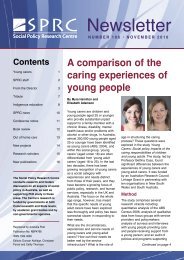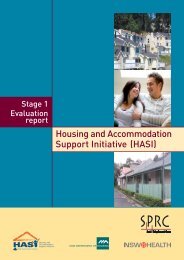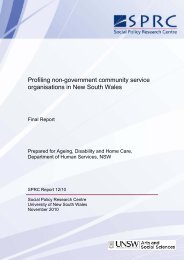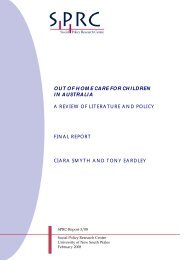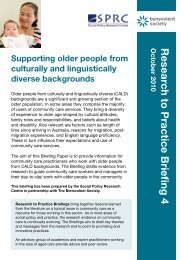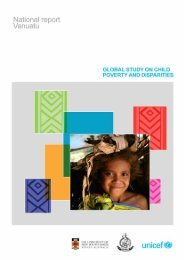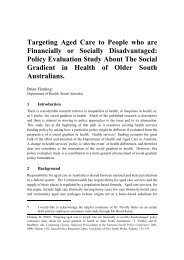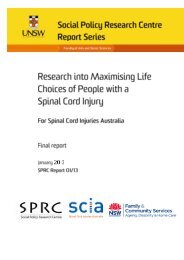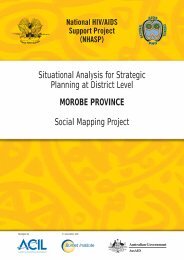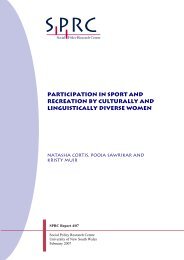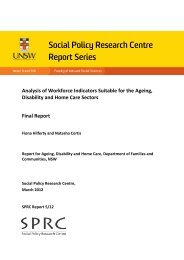A Strategic Assessment of the Children's Services Industry
A Strategic Assessment of the Children's Services Industry
A Strategic Assessment of the Children's Services Industry
- No tags were found...
You also want an ePaper? Increase the reach of your titles
YUMPU automatically turns print PDFs into web optimized ePapers that Google loves.
STRATEGIC ASSESSMENT OF THE CHILDREN’S SERVICES INDUSTRYemployment <strong>of</strong> highly qualified staff, leads to less reliance on externally imposed governmentstandards to ensure quality. Hence, commentators such as Moss (2007b) point to <strong>the</strong> presence<strong>of</strong> a skilled, knowledgeable and reflective early childhood workforce as central to <strong>the</strong> creationand sustaining <strong>of</strong> ethical and respectful early childhood services.It is important to note that within early childhood academic, policy and practitionercommunities, <strong>the</strong> notion <strong>of</strong> ‘quality’ has been contested (see for instance, Dahlberg et al.,1999). This contestation does not downplay <strong>the</strong> focus upon children’s wellbeing, but ra<strong>the</strong>rhighlights <strong>the</strong> fact that understandings <strong>of</strong>, and approaches to, good quality early childhoodservices are embedded within particular cultural and political contexts. Critics <strong>of</strong> <strong>the</strong>discourse <strong>of</strong> quality in early childhood policy fur<strong>the</strong>r claim that <strong>the</strong> concept <strong>of</strong> ‘quality’ isproblematic because ‘you have closure when <strong>the</strong> norm is attained’. They prefer to useconcepts such as ‘meaning-making’ and ‘ethical practice’ in early childhood which emphasisea skilled, knowledgeable and reflective workforce able to engage with children, families andcommunities (Moss 2007b).To develop with <strong>the</strong> stakeholders broad guidelines and curricular standards across ECECservicesThe introduction and implementation <strong>of</strong> early childhood curriculum within prior to schoolservices raises a number <strong>of</strong> policy issues and its focus is <strong>of</strong>ten contested. Key debatesconcerning early childhood curriculum, apart from those that focus upon content, includewhe<strong>the</strong>r or not <strong>the</strong>y should be compulsory, and to what early childhood services <strong>the</strong>y shouldapply. Soler and Miller (2003) describe early childhood curricula as ‘sites <strong>of</strong> struggle’ as‘parents, teachers, researchers and politicians <strong>of</strong>ten have strong and conflicting views’ about‘content and contexts for learning and development in early childhood’ (p. 59).Soler and Miller’s description <strong>of</strong> <strong>the</strong> staged curriculum developed for England as ‘concernedabout what education is for ra<strong>the</strong>r than what <strong>the</strong> experience <strong>of</strong> education might entail’ (2003,p.62, emphasis added) neatly encapsulates <strong>the</strong> tensions emerging from differingunderstandings <strong>of</strong> <strong>the</strong> nature and purpose <strong>of</strong> curriculum. These competing understandingsmight be crudely grouped as ei<strong>the</strong>r ‘instrumentalist’ or ‘socio-cultural’ in nature.Instrumentalist constructions tend to be highly prescriptive, while socio-cultural views areregarded as more appreciative <strong>of</strong> children’s agency and <strong>the</strong> experiences <strong>of</strong> children in <strong>the</strong> hereand now.The OECD in its Country Note for <strong>the</strong> UK expressed its concern about <strong>the</strong> downwardpressure placed by <strong>the</strong> school sector on early childhood services, particularly in relation togoals for early learning. The UK curriculum for 3-5 year-olds is linked to over 60 learninggoals and has been described as ‘highly prescriptive’ (Moss 2007a, p.9). The OECDcommented that early childhood settings felt under pressure to ‘resemble downwardextensions <strong>of</strong> primary school’ even though this approach is not considered supportive <strong>of</strong>young children’s learning (2000 p. 39). The OECD (2006) favors <strong>the</strong> development <strong>of</strong>curriculum frameworks that enable responsiveness to local conditions, that are respectful <strong>of</strong><strong>the</strong> pr<strong>of</strong>essional judgment <strong>of</strong> teachers, and that have <strong>the</strong> capacity to incorporate new ideas,perspectives and understandings. In this respect it is important to note <strong>the</strong> emergence <strong>of</strong> a newphenomenon, <strong>the</strong> curriculum developed and promulgated from <strong>the</strong> central <strong>of</strong>fice <strong>of</strong> a businessor corporation. For instance, ABC Learning, one <strong>of</strong> <strong>the</strong> world’s largest child care providersboasts its own curriculum (ABC Developmental Learning Centres, 2007).Alternative constructions <strong>of</strong> curriculum are less concerned with academic outcomes and moreattentive to ensuring a respectful environment for children that works with <strong>the</strong>ir naturaldispositions for learning. For instance, <strong>the</strong> NSW Curriculum Framework centres upon a26



